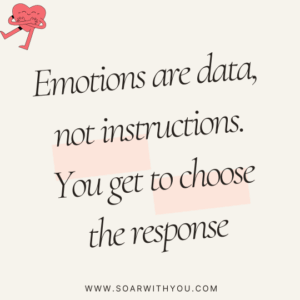Part 3: Own Your Energy — How Emotional Mastery Shapes the Life You Build
Have you ever reacted to something in a way you regretted later—snapping at someone you love, overthinking an email, or shutting down emotionally altogether? For me, road rage comes to mind. When I started driving, I recall days when I would get so angry at other drivers on the road and would carry that anger to work or home. Which was quite unfair to those around me and would affect how I reacted to the situations following the incident.
We often talk about productivity, routines, and physical health—but what about your emotional health? How you manage your emotions is one of the most underrated forms of self-leadership.
In this third part of our 10-part series on reclaiming control, we’re diving into the inner work—the work that no one else sees, but that changes everything about how you show up in the world.
In case you missed part 2 article in this series, you can check it here on Reclaiming control of your body.
Because here’s the truth: You can’t lead your life well if you’re constantly being led by unprocessed emotions.

Why Emotional Mastery Matters in Real Life
Here’s what I want you to hear clearly: Your emotions are not the enemy—but ignoring them is.
When you don’t learn to work with your emotions, they will eventually work against you.
Not because you’re weak, but because unprocessed emotions always find a way out—usually through frustration, withdrawal, or burnout.
Think of emotions like signals on your dashboard. When a warning light comes on in your car, you don’t smash the dashboard—you get curious. You investigate. Emotional mastery is just that: learning how to pay attention, process what’s underneath, and respond in ways that serve the life you actually want to build.
Here’s why it matters:
→ That sharp reaction to a loved one? It’s rarely about that one moment—it’s often accumulated stress speaking louder than you wanted it to.
→ That hesitation to start a project or say yes to an opportunity? Often, it’s not really the task that’s hard—it’s the unspoken fear or self-doubt driving the hesitation.
→ And that nagging sense of burnout? Nine times out of ten, it’s not just physical tiredness—it’s emotional clutter that’s weighing you down.
Emotional mastery doesn’t mean never feeling upset, disappointed, or afraid. It means you learn to recognize those feelings, sit with them, understand them, and then move forward with intention—not reaction.
Why? Because when you learn to lead yourself emotionally, you stop handing over your peace to other people, hard days, or outside circumstances.
Emotional mastery is self-leadership in its most personal form—and it’s one of the strongest skills you can build.


1️⃣ Create Space Before You React
One of the simplest yet most life-changing practices I’ve adopted is what I call the “pause principle.” Whenever you feel triggered or overwhelmed, create a gap between the stimulus and your response.
With time, I learnt to distance myself from the emotion, which gave me a chance to pause before reacting. Many times, the aggressor has already forgotten that they wronged you and have since moved on, but if you carry that emotion, you’ll let it out on the wrong person. You’ll need to learn to deal with the emotional weight of the day and be cautious not to pass it on.
We’ve all heard the phrase, ‘take deep breadths and count downwards from 10’. Or take 3 deep breaths before you speak. It sounds simple—but it’s powerful. It forces you to pause, think before reacting.
Try This:
→ When you feel upset, mentally say: “Pause. Choose.”
→ If possible, excuse yourself briefly from the situation. Go wash your hands, refill your water, or step outside for air.
→ Respond after clarity—not in the heat of the moment.

- Calm App Subscription – Guided meditations and breathing exercises to ground your nervous system.
- Essential Oil Diffuser – Scent therapy that promotes calm in your space.
2️⃣ Check in with Your Emotions Daily
Here’s the thing about emotions: they don’t just disappear because we ignore them.
They sit quietly in the background, shaping how we speak, how we make decisions, how we interact with others—even how we rest.
That’s why I often say: unspoken emotions don’t vanish—they accumulate.
One of the most empowering things you can do for your emotional health is to build the habit of checking in with yourself. And it doesn’t have to be complicated or time-consuming.
Think of it like a quick emotional housekeeping routine. Just as you wouldn’t go weeks without tidying up your living space, your emotional world needs regular attention too.
There was a season in my life where I’d go weeks feeling low, disconnected, or easily irritated—and I couldn’t understand why. When I started journaling even two or three lines each evening, patterns started to emerge:
→ I was saying yes to too many things I didn’t actually want to do.
→ I hadn’t processed certain disappointments, so I carried them like invisible weights.
→ And honestly, I just wasn’t giving myself permission to feel tired.
That small practice of checking in helped me get honest with myself—and from that honesty came better choices.
Try This:
→ Before bed, pause and ask yourself: “What felt good today? What felt heavy?”
→ No pressure to solve everything—just observe.
→ Bonus: On the days you feel out of sorts but don’t know why, reading back over your check-ins often brings surprising clarity.
It’s not about perfection—it’s about making space for emotional honesty so that you’re not blindsided by overwhelm later.

→ The Five Minute Journal – With its simple, guided prompts, it’s perfect for creating consistency without overthinking.
→ Mood Tracking App – Want a tech solution? Apps like these help you spot patterns over time and connect how your moods link to your habits or routines.
Remember: Clarity starts with honesty—and honesty starts with checking in.
Try This:
→ Use a journal or notes app on your phone.
→ Even one sentence a day builds emotional intelligence over time.

3️⃣ Get Comfortable Asking for Support
Let’s talk about something many of us find uncomfortable—asking for help.
For a long time, I thought that needing support meant I wasn’t strong enough. I wore independence like a badge of honor, convincing myself that “I should be able to handle this.”
Sound familiar?
I’ve come to learn that Strength is not about doing everything alone. Strength is about knowing when to ask for help before you break down. We were never designed to carry everything by ourselves.
Think about it this way:
→ We hire professionals for things like plumbing or car repairs—but when it comes to our internal world, we try to do all the repairs alone.
→ Emotions are complex. Sometimes you need an outside perspective—a friend, a mentor, a therapist, a coach—to help you untangle what feels stuck.
Many of us go through seasons where we juggle family, work, deadlines, emotional stress, and our health keeps suffering. We think: “I’ll figure it out soon.”. It took one honest conversation with a trusted friend to break that cycle. I remember her words clearly: “You don’t need to crash first to deserve help.”
That moment gave me permission to reach out sooner next time.
Here’s why asking for support is powerful:
- It prevents emotional buildup from turning into resentment or burnout.
- It strengthens your relationships, letting people be there for you deepens trust.
- It models healthy leadership to others. (Your kids, team, or community learn from your example.)
Try This:
→ Identify two or three people in your life who feel safe—the ones who listen without immediately trying to fix you.
→ Practice simple statements like:
“I’m not okay today. Can I talk this out?” or
“I’m carrying a lot right now and I just need someone to listen.”
→ And remember—if you don’t have that circle yet, it’s okay to build it gradually, or start by seeking professional spaces for support.

→ Conversation Cards for Deeper Connections – Use these to strengthen emotional intimacy with friends or partners, creating the kind of spaces where asking for help feels easier.
Asking for support doesn’t make you weak—it makes you wise.
The most powerful leaders—at home, at work, in life—are those who know that strength is shared, not hoarded.





Money is emotional, and for many of us, it’s a hidden source of stress. In Part 4, we’ll look at how to build a healthier relationship with your finances—without shame.
Your emotions don’t have to run your life.
You’re capable of showing up as a calm, clear, grounded version of yourself—starting now.
To your inner clarity!

